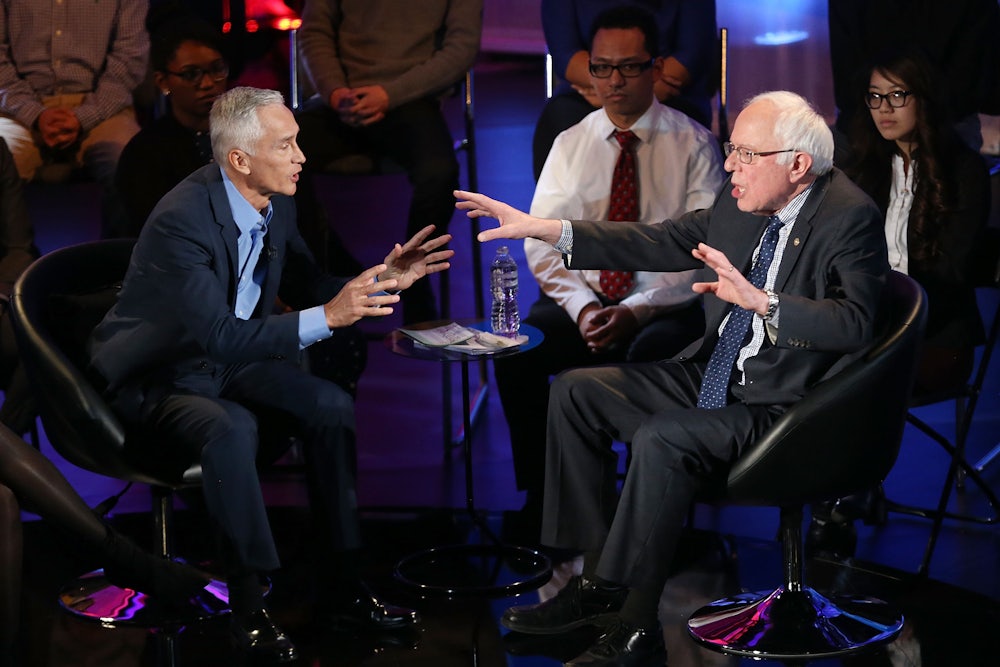A presidential debate may not be the ideal place to discuss race and gender in a nuanced manner. That said, the urgent fight against structural bias and discrimination can’t wait for a proper setting. Both the Democrats and Republicans should at least give it a try. They haven’t yet.
None of the debates to date, including Thursday’s Republican confab in South Carolina, have featured a single substantive discussion about racial justice and other issues that directly involve and interest people of color. The Republicans have largely ignored it, except for scapegoating purposes; the Democrats haven’t had discussions about race so much as presentations of talking points, often prompted by awful questions about fictions such as the “Ferguson Effect.” Fundamental issues such as reproductive rights, white nationalist terrorism, and black unemployment have received short shrift or been ignored altogether.
That should change on Sunday night when the Democratic hopefuls convene in South Carolina for the fourth of their six planned primary debates. After all, NBC moderator Lester Holt now has a sterling model for how to conduct the conversations voters of color, in particular, need to hear.
The Fusion network, owned by ABC and Univision, aired the Iowa Brown & Black Forum on Monday night. It was the first time since 2000 that the event, which bills itself as “the nation’s oldest minority-focused presidential forum,” was broadcast on a national cable network. All four of the moderators—New York writer-at-large Rembert Browne, comedian and producer Akilah Hughes, and anchors Jorge Ramos and Alicia Menendez—were either brown or black. They and their engaged collegiate audience members asked specific, incisive questions that ran the gamut from sex education to the Obama administration’s immigration raids to racially imbalanced levels of incarceration for marijuana-related offenses. Moreover, the Fusion moderators showed how to integrate more common debate topics—ISIS, public education, immigration—into a broader conversation that addressed racial justice issues. In what might have ostensibly appeared to be the most friendly public environment to date for the Democratic candidates (forum or debate), the contenders frequently found themselves more tested on identity issues than they had been to this point in the campaign.
The three candidates, thankfully, were mostly up to the task, displaying easy manners that weren’t as performative as we’ve seen during the debates. However, thanks to smart and persistent questioning, each one was tripped up on a few policy issues that matter to people of color, in particular.
Frontrunner Hillary Clinton fielded a question about white privilege from a student that she answered with a long, awkward anecdote about babysitting migrant children in Chicago during her youth. She also danced deftly around Browne’s question concerning the study of reparations.
Bernie Sanders, who flatly refused to take up reparations as president in a separate Fusion web interview, also quoted a grossly incorrect figure for black youth unemployment during the forum—he stated that it’s 51 percent, nearly twice what it actually is. In defending his 2005 vote to give manufacturers immunity from lawsuits in instances when a gun is used for criminal purposes, Sanders also proposed a measure that already exists: making a manufacturer liable when it knows its guns “are being distributed to criminal elements.”
Former Maryland Governor Martin O’Malley, still showing his dedication to canned phrases, was shaken a bit when Browne asked him about his controversial record as Baltimore’s mayor, which was marked by a decrease in crime many have attributed to the wanton, reckless imprisonment of black men throughout the city. Saying “I believe all of us bear a responsibility” and that a distrust in the Baltimore police pre-dated his mayoralty “by about 250 years” was a bad look for a man whose record continues to obscure his sensible, detailed criminal justice platform. O’Malley was even challenged by Ramos about the lack of racial diversity on his campaign staff and the fact that all of the Democratic candidates are white.
The template is there for other moderators, this Sunday and going forward, to engage topics involving racial justice in a critical manner. On Sunday, the candidates need to move even further beyond talking points and debate actual solutions to these issues. This isn’t something that needs to be done merely to assuage voters of color, but to also address real crises that are unfolding in real time during the campaign.
One such example is the water contamination emergency in Flint, Michigan, which is becoming more pressing by the day. Republican Governor Rick Snyder’s administration changed the water source for the former automobile manufacturing hub from Lake Huron to the Flint River in a cost-cutting move two years ago. Since then, the levels of lead in the water have increased, and there has been a spike in Legionnaires’ disease in the area. Snyder, who appointed “emergency managers” to run the town in 2011, asked President Barack Obama on Thursday to declare a federal emergency to help individuals and public entities who are suffering either health consequences or property losses. Thing is, Flint’s population is nearly 57 percent black. Rather than asking them to discuss the environment purely within the scope of climate change, we need to hear the candidates debate environmental justice as well.
Republicans ignored Flint on Thursday night. The Democrats need to speak about the current crisis and what they would do as president to address the long-term effects there and in other communities similarly affected. And if Clinton, Sanders, and O’Malley aren’t asked, they should take it upon themselves to raise the issue.
Watch the full broadcast of Monday’s Iowa Brown & Black Forum below.
